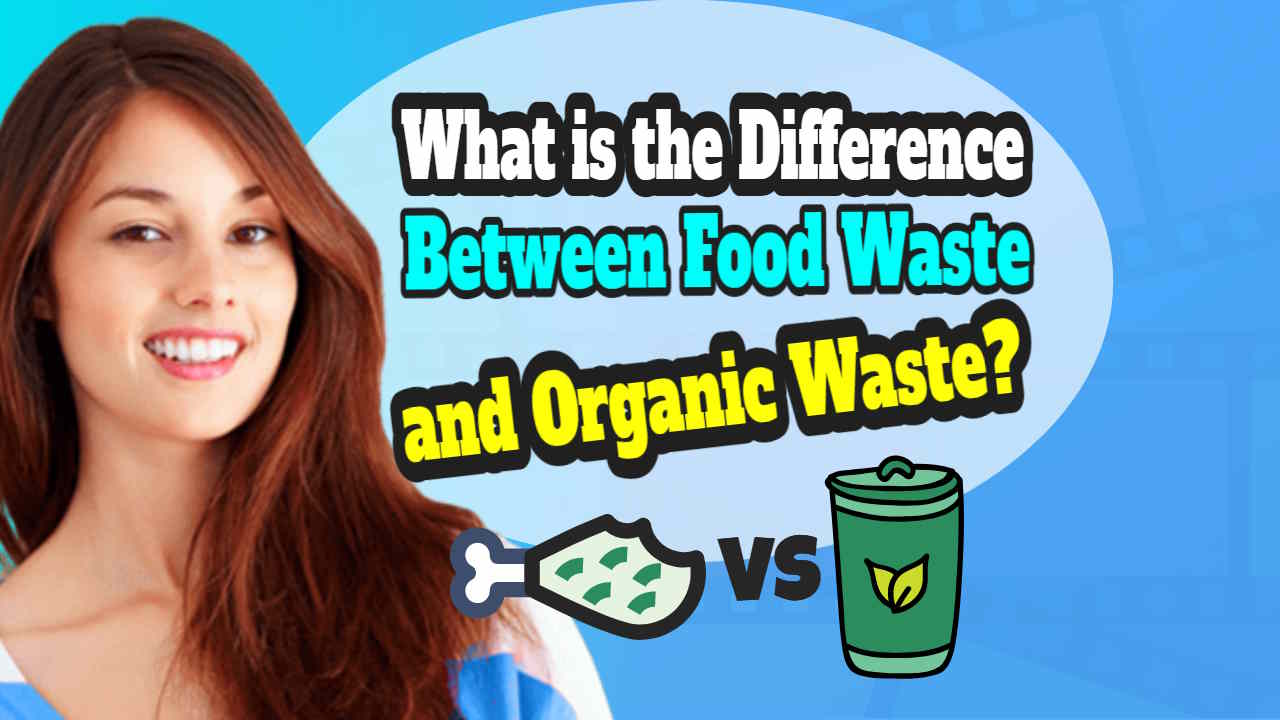The Difference Between Food Waste and Organic Waste is hugely important to know because food waste if it were a nation's climnate change impact, would be the same as the 4rd largest nation. This is all part of the understanding waste management. While waste management is critical for maintaining a healthy and sustainable environment, it is also critical to understand the various types of waste that we produce.
Food waste and organic waste are two types of waste that are frequently confused. In this article, we will look at the differences between the two in a fun way.
A Definition of Food Waste
To begin, let us define food waste. Food waste is defined as edible portions of food that are discarded before or after consumption. This includes any food left on your plate, expired food, or food left to spoil due to improper storage. Simply put, food waste is anything that can be eaten.
A Definition of Organic Waste
Organic waste, on the other hand, refers to any natural material that can decompose. Garden waste, wood chips, grass clippings, and animal waste are all examples of this. Food waste that is unfit for human consumption, such as vegetable peels, eggshells, and coffee grounds, is also included. Composting or natural decay can be used to break down organic waste.
At the Risk of Stating the obvious!
While food waste is a subset of organic waste, the important distinction is that not all organic waste is food waste. Organic waste can come from a variety of sources, such as landscaping and farming activities, whereas food waste is solely associated with food consumption and preparation.
The Impact of These Two Waste Types on the Environment
Another significant distinction is the effect they have on the environment. When food waste is disposed of in landfills, it emits harmful greenhouse gases such as methane. This is because decomposing food waste decomposes anaerobically in a landfill.
Woody organic waste and cardboard, on the other hand dosn't produce much biogas, but is better aerobically composted to produce valuable soil improver products.
Finally, while both types of waste should be reduced and properly disposed of, food waste has a greater social impact.
According to the United Nations Food and Agriculture Organization, roughly one-third of all food produced for human consumption worldwide is lost or wasted each year. This is a major issue because it contributes to hunger and poverty, particularly in developing countries.
Understanding the difference between food waste and organic waste as a whole is the first step towrd managing orgainic recycling which this article coniders now:
How to Manage Organic Recycling
Organic waste includes food waste, green waste, landscape and pruning waste, and nonhazardous wood scraps. The New York State Department of Environmental Conservation places a high priority on managing these materials through reduction, reuse, and recycling, including composting.
DSNY's Organics Collection Program collects residential curbside, drop-off site, and school organics material. This material is transported by regular route trucks to organics processing facilities for composting, biogas, and anaerobic digestion.
1. Conduct a Waste Audit
Conducting a waste audit is a great way to get an overview of the materials and types that are being generated at your business. This information will help you determine how best to manage these materials through different methods such as reduction, collection and recycling.
You will be able to see which items are the most common and how much is being diverted from landfills. This information will also allow you to make more informed decisions on how to improve your recycling program in the future.
You can conduct a waste audit on your own, or you can hire a professional company to complete the work for you. This will ensure that you get accurate and verified data that can be used to meet certain certification standards in your business operations.
2. Place Serval Bins
When we recycle organic waste, such as food scraps and paper towels, we are diverting it from landfills. This can have a positive impact on the environment by reducing greenhouse gas emissions.
A serval bin system works great to manage this type of material. It allows you to set up bins in different locations and make sure that you are getting all of the right items into each one.
Using multiple bins to collect the most valuable recyclable material will save you time, money and headaches. It will also help you meet your recycling goals.
The best way to determine the most effective system for your facility is to conduct a waste audit and then implement changes as necessary. This will give you a good idea of what you should be doing and how much waste your company generates on a regular basis. It will also show you where to put the most efficient bins.
3. Educate Employees
Organic waste is a huge problem in the United States and is responsible for 22 percent of all discarded municipal solid waste. Educating employees about the importance of organic recycling can help ensure your company meets its goal and reduces contamination in the waste stream.
Employees, contactors, tenants, and customers must properly sort organic materials into the correct containers at business establishments. In addition, businesses must subscribe to organic waste collection service through Fresno County’s approved hauler list or self-haul their organic waste to a specified composting facility or community composting program.
Food scraps and soiled paper items can be easily diverted from the trash by placing them in a repurposed kitchen container or pail. If not diverted, then place in a paper bag which is compostable and empty into the green cart on collection day. This will reduce the amount of food scraps that go to the trash and thereby protect homes from rodent visibility.
4. Keep It Clean
Keeping organic recycling clean is critical to the success of your program. This includes collecting the right materials and ensuring that your bins are always in working order.1
To start, collect food scraps and other compostable items in a repurposed kitchen container or caddie (with lid) or pail. You can even place a paper bag inside for extra control.
Once you have the appropriate containers in place, fill them up every week and empty out before collection day. To avoid pests and odors, drain liquids before adding them to your bin.
You can also use baking soda or vinegar in your bins occasionally to help absorb moisture and reduce odors. This also helps prevent insects from breeding in your cart.
You can purchase these food waste collection caddie products at your local home improvement store.
Understanding Organic Waste and Food Waste: The Role of Environmental Consultants
Defining Organic Waste vs. Food Waste
The distinction between organic waste and the sub-set of wastes known as food waste is a nuanced and complex topic. As previously discussed in this article, organic waste encompasses a broad range of biodegradable materials, including garden waste, agricultural residues, and certain industrial by-products. Food waste, however, refers specifically to edible materials discarded at various stages of the food supply chain, from production to consumption. While both types of waste are organic in nature, their management and potential for resource recovery differ significantly. Understanding these differences is crucial for effective waste management and sustainability efforts.
The Expertise of Environmental Consultants
Navigating the complexities of organic and food waste management requires specialized knowledge, which is where waste management professionals, known as environmental consultants, come into play. These experts are adept at assessing waste streams, identifying opportunities for waste reduction, and implementing strategies for sustainable resource recovery. By understanding the intricacies of different waste types, including the specific challenges and opportunities presented by food waste, environmental consultants can help companies minimize their environmental impact and comply with regulatory requirements.
Why Appoint an Environmental Consultant?
Appointing an environmental consultant can offer numerous benefits for companies striving for sustainability. These professionals bring a wealth of expertise to the table, providing tailored advice on waste management practices that align with a company's sustainability goals. From reducing waste generation to optimizing recycling and energy recovery processes, environmental consultants can guide businesses through the complexities of modern waste management. By partnering with an environmental consultant, companies can not only enhance their sustainability credentials but also potentially reduce costs and improve operational efficiency.
Using these tips will ensure that your organics recycling program is a success.
Concluding: the Difference Between Food Waste and Organic Waste
To summarise, food waste and organic waste are two distinct types of waste with significant distinctions. While both should be reduced and disposed of properly, food waste has a greater social impact, whereas organic waste can be beneficial to the environment when managed properly. Understanding these distinctions allows us to work towards a more sustainable and healthy environment.
REFERENCES:
Ref: 1. Food Waste Depackaging and Sorting - http://r5f.s3-website.ap-southeast-2.amazonaws.com/OrganicsSeparationandDepackaging/Food-Waste/Food-Waste-Depackaging-and-Sorting.html


